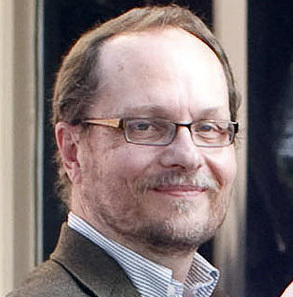A successful district manager of a large electronics chain must be laser-focused on sales metrics and promotions and processes, right? Not according to Best Buy’s Bob Sokol.
“If as a leader you're focused on things rather than people, you’re starting from the wrong place,” said Sokol. “If you're trying to drive a change in performance through a scorecard, you're starting from the wrong place.”
Sokol has spent 28 years with Best Buy, the last twelve as a district manager overseeing Orange and Riverside counties. He has a B.A. and master’s degree from Biola and an Ed.D. from University of Southern California.
“I'm a coach,” Sokol says. “My job is to help people get better — specifically, to help people get better at helping people. It's my life's mission. It's how I represent the Kingdom. That's what I do.”
Sokol was the guest speaker at Crowell’s most recent Distinguished Speaker event. Here, he shares how he has applied some of the leadership principles he learned while attending Biola, about connecting purpose and passion to performance.
People matter most
I believe people absolutely have this deep yearning for something outside themselves. As Christians, we know it’s a yearning for God. Now, I can’t talk directly about that at work — what I can do is set an example and give them a place to belong and a purpose that's bigger than themselves. I have found that what gets people in trouble is when their purpose aligns more with serving themselves than with serving other people. So, central to leadership is giving people purpose and understanding their motivations.
In business, problems are the things we’re tempted to run from, but purpose is that thing we’re running toward. When performance lags we are quick to look for problems to solve, systems to tweak or procedures to improve, and we take our eyes off of purpose. But research has found that when performance lags, it’s rarely due to employees’ lack of knowledge or skill, and it’s rarely due to external or organization issues. The vast majority of the time, it’s due to motivation problems in individuals or teams, and I have found that motivation issues are usually purpose issues.
Is our purpose maximizing our sales of widgets, or is it giving maximum satisfaction to people who need widgets? There’s a real difference there, and it requires leadership and working with helping people, not systems or things. If you want to fix things, then become a mechanic, don’t become a leader.
When I was first promoted to district manager, my new team wasn't good. They didn't even know how to be good. So we said, ‘look, we're gonna identify our hardest problem first and then we're gonna solve it together.’ Let's rally around, let's get a shared vision, let's eliminate silos, let's focus on the whys of what's causing the problems. Let’s pick a specific metric, but not focus on the outcome — let's focus on our teamwork. And at the end of three months, my team was ten times better than the average on that metric and five times better than the second best district. Corporate thought we were cheating — we weren’t — and then they wanted us to help teach the whole company.
But I told corporate, ‘you should know that we don't care about that metric’ — it was just a means to an end. What we were trying to do was build a team, to understand each other and to create a winning recipe for success so we could replicate it in other areas. Our purpose wasn’t the metric — our purpose was to learn to work together, appreciate and use our different gifts and talents, and honor the diversity of perspectives.
Of course we run the race to win. I care about performance deeply. The company I work for and the company you work for care about performance deeply. But how we get there matters.
Integrity always matters
When I was 17, I did lawn work for a neighbor and she paid me $20 by check. My dad and I went to a drive-through bank teller and cashed it, but the teller gave me $40 by mistake! Honestly? I wanted to keep it. My dad noticed, and started asking me questions: ‘Well, now whose money is that, really?’ and ‘You realize they’ll find that mistake, right?’ and ‘What if that teller loses her job over that?’ My dad was right. So we roll back to the same teller and she starts to cry and tells us she probably would’ve gotten fired. Little things matter.
When I was new at Best Buy corporate in Minnesota, my wife and I were unloading the grocery cart and noticed the checker missed the case of Coke under the cart. It had been a long day, and my wife wanted to head home and settle up the next time we came in. But I was convicted that it should happen now, so while I unloaded the rest of the cart, she took the Coke back inside. Just outside the door she ran into my new boss and his wife, and my wife explained why she was going into the store with a case of Coke. As my wife tells it, my boss clapped his hands together and said to his wife, ‘I knew I hired the right guy.’ He promoted me twice that first year and changed the trajectory of my career. Little things matter.
Those are stories of personal integrity, but of course you need professional integrity, too. If you understand retail, you know that the fourth quarter of the year is our Super Bowl. For some companies, they sell more in quarter-four than the rest of the year put together. It can make or break your whole company. At Best Buy, it was a big deal — for the stores and districts that sold the most, corporate had prizes and rewards like trips to the Bahamas. One year my boss told me about the district next to ours, and how their sales numbers were incredible, because they were discounting certain items more than corporate allowed. ‘We need to do that too,’ my boss told me. I explicitly disagreed. ‘No, no, it’s fine,’ my boss said. ‘They’re selling so much product that corporate’s not losing money. It’s a win-win!’ We argued about it over and over, and finally I promised him that our district would win the quarter-four competition without breaking policy, so he gave in.
Did we win? Oh no, absolutely not. So a few weeks later, after the numbers were tallied and the prizes awarded, he invited me to lunch. I was wondering if I still had a job. But he gave me a big hug and said, ‘That other district’s scheme that I told you about? Corporate found out and fired the guy. Could’ve been me.’ And that former boss is a Christian now and he’s mentoring a lot of people. Integrity matters. We don't know how it’ll turn out but that’s not important. Just stay faithful and live within your value system.
Communicating within power systems matters
I was put on an underperforming team, and it didn't take long to see they weren't cooperating and were even sabotaging one another. I thought, ‘Hey, I went to school for this stuff, I know how to fix this,’ and so I started pushing and talking bluntly and trying to change things. But it wasn't working — I might've even made things worse.
See, my observations were all correct and would've — in a vacuum — helped get things done, but I jumped in before I understood that team's dynamics. Knowing the right thing to do is important but it's not enough. You also need to be wise and strategic, to know how to get people to listen and buy in and change. I actually got written up because I was disruptive to the team! So I had to learn how to communicate effectively and work within those dynamics first, and then we could fix the processes.
Leadership communication involves closely watching your own ego and asking yourself questions: ‘Does it need to be said? Does it need to be said today? And does it need to be said by me?’ I was so excited to help make things better that what I saw as “speaking truth” was just offending people and making them defensive. Maybe I had a good point to make, but it didn't have to be said today, or it didn't actually have to be said by me. Recognizing and navigating power systems is critical.
Learn more about developing your own leadership skills with Crowell’s M.A. in Leadership and Innovation, Master of Management, Nonprofit Organizations, or a Bachelor of Science in Business Administration, emphasis in Entrepreneurship.
The Crowell Distinguished Speaker Series brings a selection of accomplished business leaders to campus to share their varied professional and personal insights and provides the opportunity to network with fellow attendees including alumni, MBA mentors, faculty, and current and prospective MBA students. The event is always free and open to all. Future events can be found on the Crowell events calendar.
 Biola University
Biola University.jpg)


.jpg)
.jpg)
